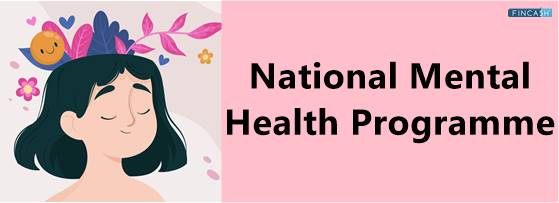National Mental Health Programme
Digital health has been prioritised as part of the Digital India programme, mainly since the Covid-19 outbreak. Budget 2022 has gone even further to improve residents' health. The finance minister also announced establishing a National Telemental Health Program, with National Institute for Mental Health and Neurosciences (NIMHANS) serving as the nodal organisation.

With overall health being endangered due to the pandemic, people's mental health suffered majorly. Unfortunately, this overall health arena has gotten little attention from residents and health providers alike. This has encouraged the Indian government to take a significant step towards mental health; hence, the national mental health program was introduced. Let's find out more about it in this post.
A Need for a Mental Health Program
Job losses, a lack of social contact, and several other personal and career-related worries caused by the pandemic have contributed to a rise in mental health concerns worldwide. According to the National Health Mission of the Indian government, 6-7% of the population suffers from mental problems. As per the World Health Organization, one out of every four families is expected to have at least one person with a behavioural or cognitive problem.
Although these families provide emotional and physical support, they also face the shame and discrimination that comes with it. The vast treatment gap is due to a lack of understanding of mental illness symptoms, myths, stigma and insufficient knowledge about treatment options.
National Health Mission
During the budget speech, India's Finance Minister, Nirmala Sitharaman, acknowledged the impact of the ongoing Covid-19 pandemic on the mental wellbeing of a large segment of the population and responded by declaring the establishment of the National Tele-Mental Health Programme for individuals of all ages.
Considering that the pandemic has exacerbated mental health issues in people of all ages, such a program improves access to high-quality mental health therapy and treatment services. Accordingly, a chain of 23 tele-mental health centres will be established, with NIMHANS serving as the nodal centre and the IIIT-Bangalore providing technical assistance.
The health sector's Budget Estimate for 2022-23 is Rs. 86,606 crore, according to the Union Budget 2022 document. This represents a 16% increase above the Rs. 74,602 crore Budget Estimates for 2021-222.
Talk to our investment specialist
Objectives of NHMP
To help the citizens understand the vitality of mental health and take the proper steps, the NHMP initiative was launched with the following objectives:
- To ensure mental health awareness in both general health treatment and social development
- To make sure mental health care services are available and accessible to everyone
- To encourage community involvement in mental health care
- To offer the community long-term fundamental mental health care integrated with other health services
- Symptoms' detection and treatment at an early stage
- To ensure less travel distance for patients and their families to receive mental health care
- To relieve strain on larger or more central mental hospitals
- To lessen the stigma and discrimination that people with mental illnesses face
Mental Health Care Funding
In light of these circumstances, it appears that mental health in India is a topic that is frequently overlooked. The Health and Family Welfare Ministry was given a corpus of Rs. 71,269 crore in the 2020-21 budget. The budget for mental health treatment, Rs. 597 crores, was also included.
Only 7% of this was set aside for the National Mental Health Programme, with the majority going to two institutions: Rs. 500 crore for the National Institute of Mental Health and Sciences (NIMHANS) in Bengaluru and Rs. 57 crore for the Lokpriya Gopinath Bordoloi Regional Institute of Mental Health in Tezpur. This year, though, the situation appears to have altered.
Testimony to the Government's Commitment
The government's commitment to creating robust health systems is also demonstrated by releasing an open platform for the National Digital Health Ecosystem, including digital registries of health providers and facilities, access to universal healthcare facilities, and unique health identity.
Telemedicine is becoming more widely recognised as a viable approach for expanding access to healthcare, and the Telemedicine Practice Guidelines were jointly produced by the Ministry of Family and Health Welfare and NITI Aayog in March 2020. In a report published in 2021, the think tank estimated that India's telemedicine sector was worth $830 million in 2019. Mental health care would now be included in the package.
Future in the Mental Health Sector
As per Asian Institute of Medical Sciences, global cases of anxiety and depression have increased by 35% in India alone. By emphasising the importance of focusing on mental and emotional wellness, the budget demonstrates how forward-thinking the nation has become. The mention of mental health in the union budget reflects the government embracing and caring for holistic and physical health, as the pandemic has brought to light.
The expenses in the medical sector are pegged at Rs. 86,606 crores, compared to Rs. 74,000 crores in the existing Fiscal Year, which is a marginal gain, but coupled with the overall increased Capital expenses; it is hoped that the healthcare Industry will get a boost. Providing an interest-free loan of Rs. 1 lakh crore to states will have a good influence on state investment in healthcare infrastructure.
These are little efforts, but if a robust database is in place, it will have a long-term influence on health system strengthening and equity.
Final Words
In the end, suppose the government genuinely want to see an impact. In that case, it is critical to recognise that preventative mental health facilities that focus on developing resilience skills must be implemented with counselling services in institutions, schools, and communities. The entire initiative can be designated as the first of six pillars to boost three critical areas: preventive, curative, and general wellbeing.
All efforts have been made to ensure the information provided here is accurate. However, no guarantees are made regarding correctness of data. Please verify with scheme information document before making any investment.












